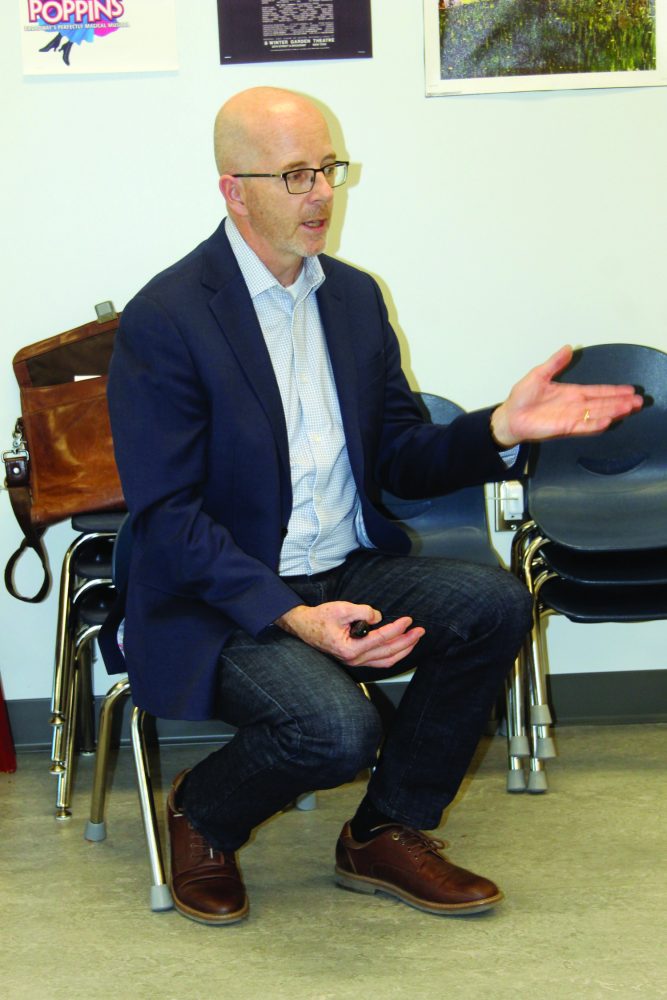Stavely school parents, staff learn how children’s brains learn
By Rob Vogt
Understanding how children learn is an important part of their education.
On Oct. 18, Stavely Elementary School welcomed Dr. Chris Mattatall from the University of Lethbridge, who discussed how children’s brains learn.
“Parents are heroes, teachers are heroes,” he opened, adding many teachers treat students as their own.
Children are born with billions of neurons, he explained.
“We have an amazing brain,” Mattatall said. “Our children have an amazing brain.”
A study found the average words a day parents speak to their children is 21,000.
By the fourth year, the difference from parents who talk to their children a little and a lot is about 31 millions words difference.
“The more the teacher talks to your children the better,” Mattatall said. “It’s so important for parents to talk to their children.
“You can never talk too much.”
Mattatall noted there is a very important component to that.
“The outer speech we hear, determines the inner speech we repeat to ourselves,” he said.
Mattatall then talked about children as readers.
The brain is not wired to read. Instead, it has to be re-trained to read. That means being able to pair a sound and a symbol, and map them together. All humans have the same cognitive architecture, and reading skills are acquired using the same language part of the brain.
So repetition is needed, and children need to be trained with a growth mindset.
It typically takes four to 14 exposures to learn a new word. Struggling learners require 14 to 40 exposures, while a dyslexic requires 40 to 200 exposures.
Think about a classroom with all of this and think about the teacher, Mattatall said.
He stressed success determines motivation, not the other way around.
Moreover, students’ beliefs guide their self talk, and their self talk guides their actions.
Fear, anxiety and embarrassment often result when students think mistake-making or not-knowing is linked to how good they are or how worthwhile they are.
Mattatall pointed out children will say they hate math or reading when, in fact, they hate how it makes them feel.
Since parents are a child’s first teacher, when they hear their child say that, it is important to build a new script.
Instead of “I hate math”, say “You’re a learner.”
A negative internal script will have a negative effect on learning.
Mattatall noted people, children included, have a fight, flight or freeze response to threats. Unless that threat is relieved, the brain will keep doing its primary job which is protecting itself. That’s why bullying is so detrimental to learning.
Consequently, schools also want mistake-making to be a normal part of learning.
It can alleviate that stress that negatively affects the internal script and its impact on learning.
One way to help that is to break a task down into teachable parts, then start building it slowly through repetition.
Learning is the process of change over time. Through small, incremental stages it can be caused to happen through effort.
Mattatall said there are fixed and growth mindsets. Changing from fixed to growth is trying to get to a different internal script.
He emphasized if children believe they can do something with hard work and effort, they can.
Part of that, he cautioned, is to encourage not to praise. For example, instead of saying a child is successful because he or she is born that way, they did it by applying the correct strategy, working hard and through effort.
Mattatall said when failure is attributed to a lack of ability, it de-motivates children.
He reiterated success determines motivation, not the other way around.
It is important to build wins when a child is learning, because that will motivate them to keep going.
Mattatall said the truth is a lot of new learning is difficult. It takes effort and success to get it to stick in long-term memory.
He concluded by emphasizing effortful learning, repetition and a positive inner script will help children learn.


